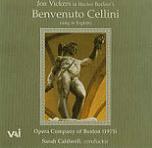This abbreviated (by about 25 minutes), sung-in-English, live performance of Cellini was taped in Boston in 1975; it’s primarily (possibly solely) of interest to fans of Jon Vickers. Sarah Caldwell’s conducting is exciting and disciplined, and despite its live origin the opera never seems on the verge of falling apart in the big ensembles–a real achievement. Vickers is thrilling in the exclamatory passages and his enunciation is impeccable–but he nevertheless seems miscast. He sings the role as if it were Aeneas. His big last-act aria is cut and we don’t miss it: the top of his voice is not at its best here and it only would have showcased the problem–he cracks on high notes more than once.
Patricia Wells is a nice, girlish though incomprehensible Teresa who has trouble in the coloratura passages; John Reardon’s Fieramosca is properly arrogant and well sung; Donald Gramm’s Pope is authoritative. The others are good enough, the orchestra plays well, and the chorus is only occasionally ragged. The sound isn’t bad–including the voice of the prompter–but, as I said, this is for Vickers fans. Those who love/want this opera should stick with Colin Davis on Philips.
































